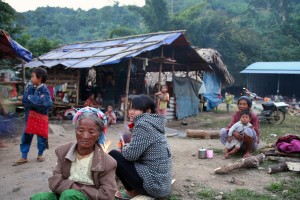A report released today in Bangkok by Human Rights Watch accuses Chinese authorities of forcing Kachin refugees back across the country’s border with Burma, amidst escalating conflict between Kachin armed forces and the Burma’s Army.
 Since open war erupted between the Kachin Independence Army (KIA) and Burma’s military in June last year, a growing tide of ethnic Kachin have sought refuge in China’s Yunnan province, but are finding Chinese authorities unwilling or unable to provide them with adequate access to basic supplies, including clean water, food and shelter.
Since open war erupted between the Kachin Independence Army (KIA) and Burma’s military in June last year, a growing tide of ethnic Kachin have sought refuge in China’s Yunnan province, but are finding Chinese authorities unwilling or unable to provide them with adequate access to basic supplies, including clean water, food and shelter.
The HRW report entitled ‘Isolated in Yunnan: Kachin Refugees from Burma in China’s Yunnan Province’, describes how escalating ethnic conflict in Burma has caused an unwelcome refugee crisis on China’s southern border. Chinese authorities are accused of turning a blind eye, or of even stopping refugees from entering Yunnan.
The HRW report released by Human Rights Watch at the Foreign Correspondents Club of Thailand, identifies that between seven and eleven thousand ethnic Kachin refugees have fled war and human rights abuses perpetrated by Burma’s military, since hostilities started in June 2011.
The HRW report also documents at least two incidents of Chinese authorities “ordering Kachin refugees to return to Burma” against their will, and refusing Kachin asylum seekers at border checkpoints – involving around 300 people.
Many refugees staying in Yunnan province face a life of uncertainty on the border, “I worry as the fighting continues, if the Chinese don’t accept us, where will we go? Where can we live?” one 25-year-old Kachin refugee said.
“The refugees are vulnerable to exploitation by local employers,” as they seek any job that will give them some money or food, the report stated. The report also claimed that Kachin refugees have been subject to roadside drug testing, arbitrary fines, and prolonged and abusive detention by Chinese authorities.
“China has no legitimate reason to push the Kachin refugees back to Burma, or to leave them without food and shelter,” Sophie Richardson, China director at Human Rights Watch said.
China is a party to the 1951 Refugee Convention and its 1967 Protocol, which aims to protect the human rights of refugees and asylum seekers.
The Refugee Convention prohibits the forced return “in any manner whatsoever” of refugees to places where their “life or freedom” would be threatened.
“The Chinese government is not only legally obligated, but fully capable of temporarily protecting Kachin refugees and meeting their basic needs,” Richardson added.


